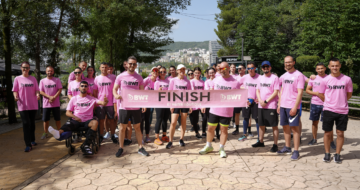Research center imec and KU Leuven present energy-efficient AI chips for robots

Research center imec and KU Leuven have developed a new type of chips for robots that work with artificial intelligence (AI). The chips combine a digital and analog coprocessor: in this way, the calculations that the AI performs can be accelerated, and energy is saved at the same time.
Research center imec and KU Leuven have developed a new type of chips for robots that work with artificial intelligence (AI). The chips combine a digital and analog coprocessor: in this way, the calculations that the AI performs can be accelerated, and energy is saved at the same time.
Research center imec and KU Leuven have developed a new type of chips for robots that work with artificial intelligence (AI). The chips combine a digital and analog coprocessor: in this way, the calculations that the AI performs can be accelerated, and energy is saved at the same time.
Two years ago, imec developed a new type of chip with analog technology. The calculations that that type of chip performs are performed directly in computer memory. That makes it possible to perform most of the operations ten to a hundred times more energy-efficient than in a digital accelerator. For another part of the operations, in turn, the computational precision and programmability of a digital accel erator is better suited.
To combine these two advantages, imec has developed a processor that merges analog and digital technology. This led to the development of a new chip: the DIgital and ANalog Accelerator (DIANA).
The hybrid chip automatically performs the operations on the coprocessor best suited for each specific task. For some applications, such as pattern recognition, an analog processor is best suited. Other applications, such as reasoning about those observations, also require a digital coprocessor. The chip from KU Leuven and imec combines the two processors so that computations are always performed in the most energy-efficient way.
The chips combine a digital and analog coprocessor: in this way, the calculations that the AI performs can be accelerated, and energy is saved at the same time.
Latest insights & stories

A Global Movement: The World Unites in a Pink Pledge for Clean and Sustainable Water
5,000 participants. 32 countries. €30,000 funds raised. And that's just the beginning.
Picture this: One step that sends ripples across the globe, transforming lives and creating waves of change. You might wonder, how can such a simple action for most of us have such a profound impact?

Sustainability and circularity in construction
Join us in transforming the future of construction, creating buildings that not only stand the test of time but also contribute to a healthier planet!

RainTunes: Shower scenarios for the soul
Light, hearing, smell, and touch: Together with experts, we have developed sensuous scenarios that turn showering into an individual experience. Whether you want to prepare for the day ahead or relax after working out. Whether you want to refresh after a day’s work or unwind at the end of the evening: RainTunes surprises with multisensory experiences.*
*Currently available only in Germany and Austria.